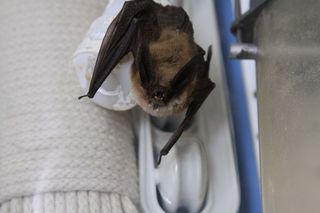
Western long-eared myotis
Order : Chiroptera
Family : Vespertilionidae
Subfamily : Vespertilioninae
Species : Myotis evotis
The Long-eared myotis is listed as Least Concern (LR/lc), lowest risk. Does not qualify for a more at risk category. Widespread and abundant taxa are included in this category, on the IUCN Red List of Threatened Species
Some facts about the
Western long-eared myotis
Adult weight : 0.007 kg (0.0154 lbs)
Maximum longevity : 22 years
Litter size : 1
Interval between litters : 365 days
Weight at birth : 0.001 kg (0.0022 lbs)
Facts about the western long-eared myotis
Range MYOTIS EVOTIS is widespread and probably found throughout the entire state.
The long-eared myotis, Myotis evotis, is a small bat that occurs in western North America. (Full text)
Myotis evotis is distributed from British Columbia, south to Baja California and east to North Dakota, and then southward through South Dakota, Nebraska, and New Mexico; excluding the southern deserts of Arizona and California. (Full text)
1996: Myotis evotis is expected, though not documented on the San Andres NWR, NM (Wiesenberger, 1996) *59*.
Comments on General Habitat Associations The long-eared myotis (Myotis evotis) is seemingly a species of the yellow pine zone and above.
Long-Eared Myotis (Myotis evotis) is listed as a species of concern.
The western long-eared myotis is found in a variety of habitats but most often in coniferous forests.
Myotis evotis - western long-eared myotis The western long-eared myotis is a medium-sized bat with long black ears and dark wing membranes.
More animals beginning with W
